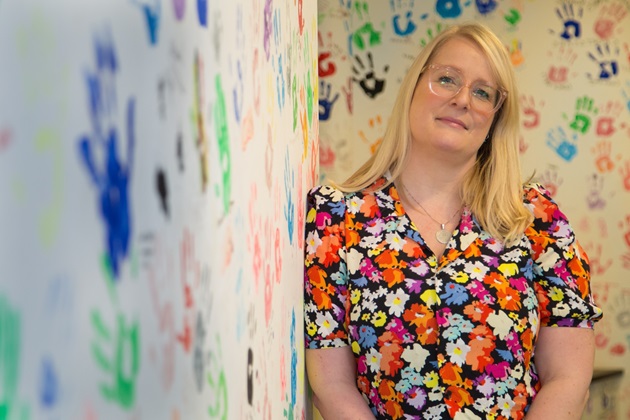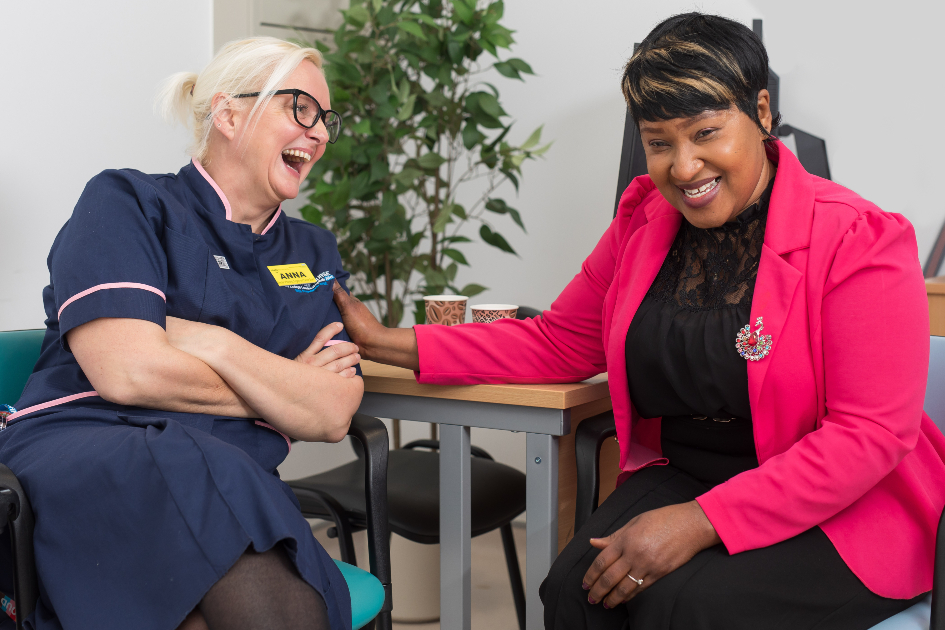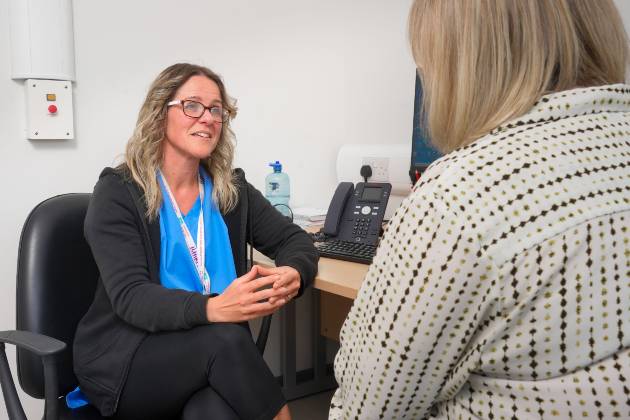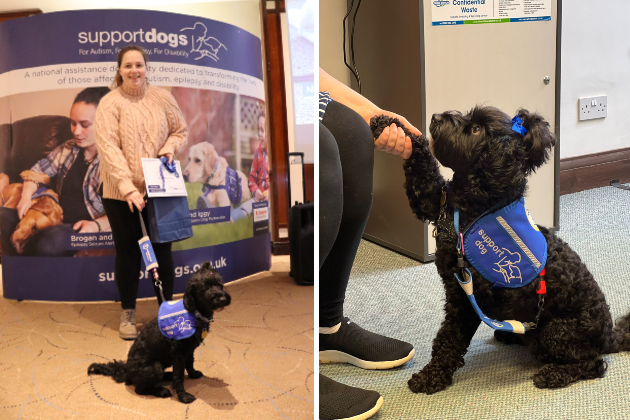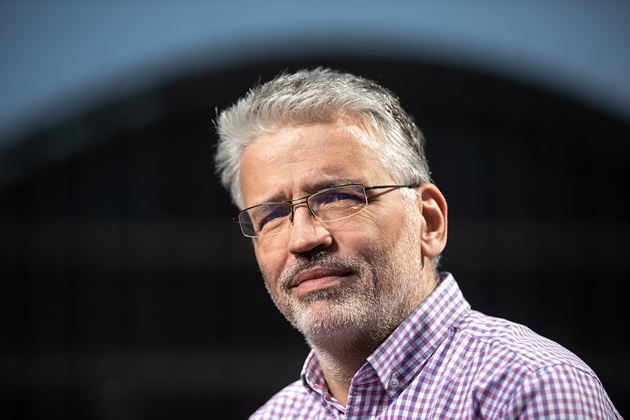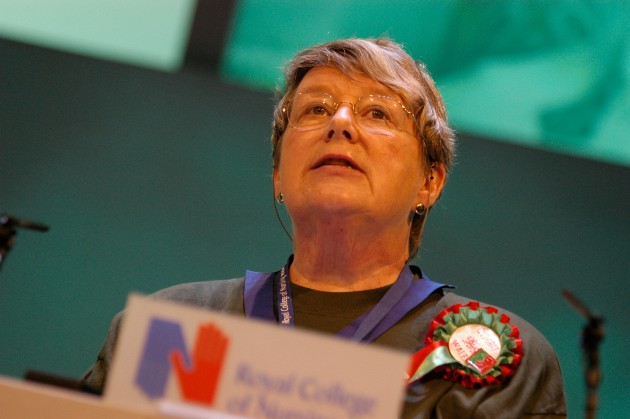Sophie is there for young people with life-limiting conditions and their families when they face a change in care provision
Nursing staff working in children’s hospices know their primary role isn’t to aid recovery, and one day they may have to say goodbye to their patients for ever.
But now advances in medical care and lifesaving technology mean more and more children with life-limiting conditions and complex needs are living into adulthood. The new reality facing many of their patients is that they will one day out-grow the services a children’s hospice can offer.
The transition they face into adult services in health and social care can be unsettling and frightening. And the services they may be offered going forward will not compare to the support they’ve received in a children’s hospice environment.
In her role as a specialist transition nurse, Sophie Williams, who works in a children’s hospice in south Wales, helps young people and families through this difficult time. “We work in partnership with adult services and try not to duplicate work. But I’m here to hold their hands for just a little while longer,” she says.
We see beyond their life-limiting conditions and they trust us
Sophie, who’s worked at Tŷ Hafan children’s hospice for almost 20 years, says she first saw a gap in family support when children were being discharged as older teenagers. With local adolescent services full to capacity, she’s now able to provide back-up for young people facing extreme challenges.
“We’re working with a generation of veterans,” she says. “A lot of their peers have died. Alongside their grief, they’re dealing with the emotional and physical challenges that come with adolescence and their own physical problems.
“We see beyond their life-limiting conditions and they trust us. I felt it wasn’t quite time to let them face this alone.”
Families need support too. “Parents who’ve been caring for their children have been hugely upskilled but felt very left out in this new world,” Sophie adds.
Skills workshops
To guide young people and their families through this new major step in their lives, they can attend skills-based group workshops on issues such as health, education and housing. It’s hoped that these will help young people to live their lives as independently as possible, according to their wishes, after they’ve left the care of the hospice.
Sophie explains: “Our transition hub can offer a one-stop-shop with no rigid time constraints. It’s a chance for an open conversation, to meet other families, and speak to outside agencies.”
In the workshops, Sophie tackles difficult subjects, including advance care planning, future treatment options and living independently from parents. But there’s also sessions for young people to discuss their thoughts and feelings about their condition, or discuss healthy relationships, including love and lust, with Sophie emphasising that no question is off limits.
Sophie says: “Legally and practically some things are different for young people who are responsible for their own life decisions once they reach 18 years of age. Everything we do is aimed at young people gaining independence, striving for opportunities with decisions and life choices that will affect their everyday lives.”
The needs of a young person can be different to those of the family
Some of the workshops are designed for young people, some are aimed at their families, and some they attend together.
“The needs of the young person can be different to those of the family, but it can also be hard to ask some questions in front of those you love,” Sophie says. “We make all the workshops as accessible to everyone as possible, and each session is evaluated afterwards and adjusted if necessary.”
These sessions also provide a chance to address the immediate practicalities facing families. Some may have come as an unwelcome shock.
“Some parents are so caught up with keeping their children alive, they can’t think about how payments will change, so we offer a signposting service too,” Sophie explains. “But it’s also about being honest and managing parents’ expectations. Staff know them here and they can stay with their child on the ward. Things might be very different going forward.”
We want them to feel comfortable asking their peers what they'd do. If we're not needed that's a success
It’s not all serious stuff though. The transition hub offers much-needed socialising opportunities to bring a degree of normality to everyone’s lives, with the young person’s group, known as the Squad, keeping in touch with each other on their own Facebook group.
“The proms we’ve had are great,” Sophie says. “Many of our young people haven’t had the opportunity to go to their school proms, but actually parents love them too. One mum told me that it was the first time she’d danced with her son since he was 10.”
Some prefer to go bowling or take part in a “Come dine with me” challenge, while others just want to come back and see their friends at Tŷ Hafan.
In fact, the development of a peer support network is central to the whole programme.
“We want people to feel comfortable asking their peers what they’d do or how they feel,” Sophie says. “If we’re not needed, that’s a success. It’s best that they don’t know we’re even there.”
Impact
Sophie’s work has maximised opportunities for young people to embrace life to the full. Some have started higher education and others have been able to enhance their lives through travel.
Families can now phone for advice on issues like advocacy, consent and capacity or simply to say: “We’ve got a hospital appointment. Would you like to come along?”
The transition nurse role has also changed the way nursing staff are able to work directly with families. Sophie recounts just one example: “I worked with one young man here who I’d known for 10 years. His consultant suggested he started tube feeding as he was finding eating more difficult. His mum phoned me to ask me to talk to him. He wasn’t interested in what his consultant had said. He’d shut off when phrases like ‘deteriorating condition’ were used.
“I invited him to come to the hospice for lunch and asked him to let me talk to him for just 10 minutes – I said he could even time me on his phone as I knew he wasn’t keen on talking about this. I was able to use that time to break down the detail and explain that making this change could have a positive impact on his quality of life, but I stressed it was important to do that now while he had the control.”
As she reflects on her role, it’s clear that Sophie loves what she does. “I’m proud that I have autonomy as a practitioner and that I have known these people,” she says.
This article was written before the start of the pandemic.
‘It’s been hard not to see the young people’
Sophie shares her experience of working through the COVID-19 pandemic
The last few months have been challenging, but like everyone else, we’ve had to adapt. Although I’ve mainly been working from home, I’ve ensured I remain visible to families and respect the challenges they’re facing.
Nearly all the families I work with have been shielding and many have just been grateful for a FaceTime call. But we’re also using a closed social media group that I oversee and signposting to wider Tŷ Hafan family support and play therapies. We focus on wellbeing posts and ways the group can support each other. I’ve kept in touch with those who don’t use social media with phone calls or letters.
For families who need specialist clinical advice and support we’ve arranged bespoke one-to-one chats and socially distanced meetings. The hospice has remained open for those who have needed more individual support. We even facilitated a socially distanced 18th birthday party there.
The Squad have embraced Zoom and held virtual activity sessions and social group meet ups. This often needs to be facilitated with parent participation as some of the young people we work with are not able to communicate in this way.
Practical support is important too. I've delivered food parcels donated from Together For Short Lives and other voluntary agencies, and picked up prescriptions too.
As lockdown eases, people are feeling anxious about going out again so it’s important that we are there to reassure them, help with coping skills and managing expectations.
It’s been hard not to see the young people in the ways I usually would. But this way of life is likely to continue for some time so we’re always considering new ways of working to best fulfil people's needs.
Further information
- Sophie won the Suzanne Goodall Paediatric Nursing Award in the RCN in Wales Nurse of the Year Awards in 2019. You can read more information on the RCN Wales website.
- Read the RCN subject guide on transition to adult services.
- Sophie’s role is currently part-funded by UK-wide charity, Together for Short Lives as part of their Improving Transition for Young People Fund. Read more about moving to adult services on the Together for Short Lives website.


